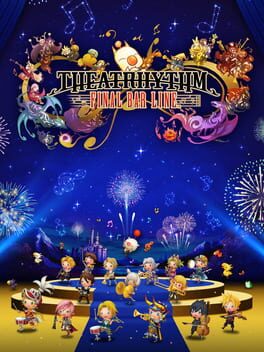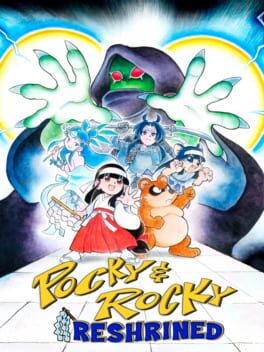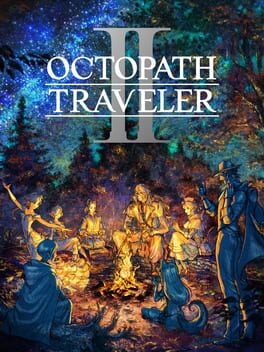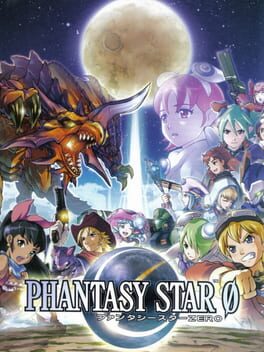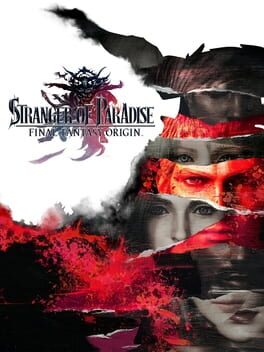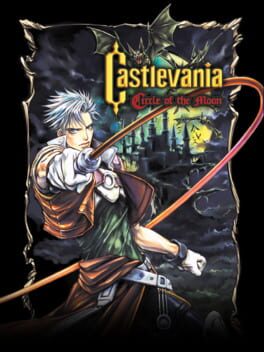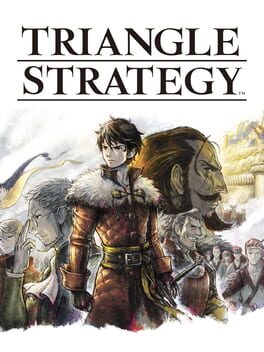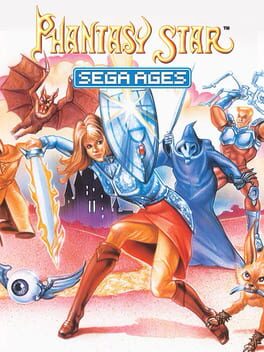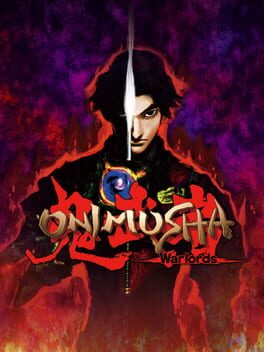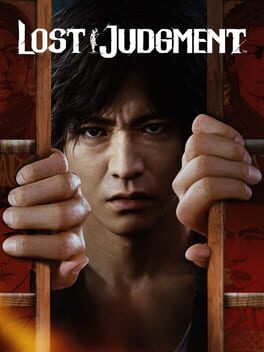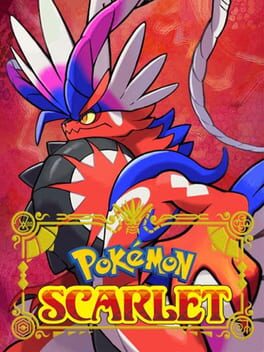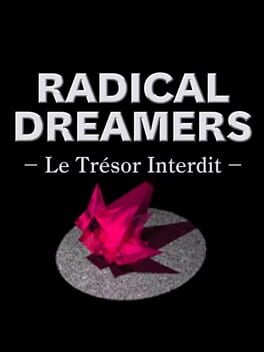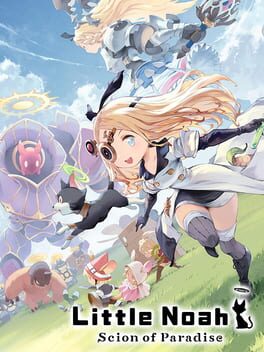ArrenSol
Easily my favorite entry in my favorite rhythm game series. While I have some minor criticisms about character availability (basically only the characters from All-Star Carnival made it) and mechanical transparency (detailed below), the complete experience more than makes up for it with a staggering 400+ tracks (as of this writing), entertaining multiplayer, and a very easy quick-play game flow. With that, on to my main gripe:
Although Theatrhythm's signature RPG mechanics do take something of a backseat to the core loop -- you can still clear songs and score points completely independently of a party comp -- nearly every song in the base game has an accompanying quest to complete. They range from simple (clear this song on xyz difficulty) to grueling (complete with a perfect chain), with some even falling back on proper setup of a proper RPG party to clear (i.e. defeating bosses with a weak element, activate x abilities, beat y enemies). For those, there's a surprising lack of transparency about what actually gets you there. Abilities tell you exactly what they do, but stats' effect on beating enemies or travelling through the game's field stages is otherwise ambiguous, and there's no bestiary to cross-reference enemy patterns and weaknesses other than a stage highlight showing you ONLY the boss's weakness. It often results in having to repeat a song, sometimes multiple times, to see how to sequence abilities and even just to hope for the best. Plenty of times I'd full combo songs and fail quests despite having a jacked party, just because I was missing a key ability or two. While it isn't outwardly -frustrating- (i.e. I'm still very much enjoying playing the rhythm game), it did occasionally leave me scratching my head wondering why there wasn't some quick reference for status effects outside of very short load screens, or why the developers couldn't just tell me that Shinra grunts are weak to fire in a side page. THAT BEING SAID...
This and the character/song availability seriously didn't detract from my experience in a debilitating way. Final Bar Line is JAM packed with excellent music from all across the Final Fantasy (and soon to be non-FF Square Enix) series, giving me much-increased appreciation for music from titles like Record Keeper and FFXIII, regardless of my feelings of the games they came from. It runs perfectly clean on the Switch, with friendly load times and a clean 60 FPS for every music stage without really sacrificing too much visually. Multiplayer PVP is a blast with bursts on, and rewards thoughtful party composition, which was a huge surprise for me. Charts are very carefully crafted with clever enemy placement (TFF has always been quite good about the "if-you-know-you-know" enemy layouts appropriate to each music track) and the return of Supreme difficulty from the Arcade-only All-Star Carnival means players are sure to have their work cut out for them if they want to take on every challenge FBL has to offer.
Make no mistake -- this is the full package Theatrhythm game I'd always hoped for, and it has a bright future with planned content for the next few months bringing the likes of Chrono, Mana, SaGa, and other SE mainstays into the fold. Absolutely well worth your time if you're an FF fan or if you simply enjoy an excellent rhythm game with a little extra.
Although Theatrhythm's signature RPG mechanics do take something of a backseat to the core loop -- you can still clear songs and score points completely independently of a party comp -- nearly every song in the base game has an accompanying quest to complete. They range from simple (clear this song on xyz difficulty) to grueling (complete with a perfect chain), with some even falling back on proper setup of a proper RPG party to clear (i.e. defeating bosses with a weak element, activate x abilities, beat y enemies). For those, there's a surprising lack of transparency about what actually gets you there. Abilities tell you exactly what they do, but stats' effect on beating enemies or travelling through the game's field stages is otherwise ambiguous, and there's no bestiary to cross-reference enemy patterns and weaknesses other than a stage highlight showing you ONLY the boss's weakness. It often results in having to repeat a song, sometimes multiple times, to see how to sequence abilities and even just to hope for the best. Plenty of times I'd full combo songs and fail quests despite having a jacked party, just because I was missing a key ability or two. While it isn't outwardly -frustrating- (i.e. I'm still very much enjoying playing the rhythm game), it did occasionally leave me scratching my head wondering why there wasn't some quick reference for status effects outside of very short load screens, or why the developers couldn't just tell me that Shinra grunts are weak to fire in a side page. THAT BEING SAID...
This and the character/song availability seriously didn't detract from my experience in a debilitating way. Final Bar Line is JAM packed with excellent music from all across the Final Fantasy (and soon to be non-FF Square Enix) series, giving me much-increased appreciation for music from titles like Record Keeper and FFXIII, regardless of my feelings of the games they came from. It runs perfectly clean on the Switch, with friendly load times and a clean 60 FPS for every music stage without really sacrificing too much visually. Multiplayer PVP is a blast with bursts on, and rewards thoughtful party composition, which was a huge surprise for me. Charts are very carefully crafted with clever enemy placement (TFF has always been quite good about the "if-you-know-you-know" enemy layouts appropriate to each music track) and the return of Supreme difficulty from the Arcade-only All-Star Carnival means players are sure to have their work cut out for them if they want to take on every challenge FBL has to offer.
Make no mistake -- this is the full package Theatrhythm game I'd always hoped for, and it has a bright future with planned content for the next few months bringing the likes of Chrono, Mana, SaGa, and other SE mainstays into the fold. Absolutely well worth your time if you're an FF fan or if you simply enjoy an excellent rhythm game with a little extra.
This isn't out in NA territories yet, but I happened to be lucky enough to play the JP version of the game and I could not have been more enthused about it. Crisp, classic arcadey gameplay, a clean, enjoyable soundtrack, and just impeccably strong pixel art throughout. Environments are lushly detailed, with elaborate pixel effects that blend in seamlessly with the rest of the on-screen action.
Docked just a half point because one of the (IMO) biggest draws, the 2-player Free Mode, is locked behind either clearing Story Mode or collecting 10,000 coins. If you're reasonable at playing the game on Normal you'll definitely finish Story Mode first, but even the game's Normal difficulty is going to have some punishing stretches. Fortunately for some, the difficulty is a little bit offset by the game's checkpoint system, which allows players to continue Story Mode in the event of a game over. It won't get in the way of anyone looking for that juicy 1CC, either - players can have their dango and eat it, too.
As more of a "reimagining" of the original Pocky & Rocky than a straight remake, Reshrined introduces some neat new mechanics and a host of new playable characters, available at select points in Story Mode and free to choose in Free Mode. Each character has its own quirks and style to work with, and no two characters really play alike, so there's a lot of replay value in testing your mettle with the whole cast.
If you're at all a fan of the original SNES game, you are not gonna want to miss this one. It's a step up in just about every conceivable way, but I don't mean that as disparaging towards the OG -- I'm overjoyed to see a legend like this brought back with some modern flair.
Docked just a half point because one of the (IMO) biggest draws, the 2-player Free Mode, is locked behind either clearing Story Mode or collecting 10,000 coins. If you're reasonable at playing the game on Normal you'll definitely finish Story Mode first, but even the game's Normal difficulty is going to have some punishing stretches. Fortunately for some, the difficulty is a little bit offset by the game's checkpoint system, which allows players to continue Story Mode in the event of a game over. It won't get in the way of anyone looking for that juicy 1CC, either - players can have their dango and eat it, too.
As more of a "reimagining" of the original Pocky & Rocky than a straight remake, Reshrined introduces some neat new mechanics and a host of new playable characters, available at select points in Story Mode and free to choose in Free Mode. Each character has its own quirks and style to work with, and no two characters really play alike, so there's a lot of replay value in testing your mettle with the whole cast.
If you're at all a fan of the original SNES game, you are not gonna want to miss this one. It's a step up in just about every conceivable way, but I don't mean that as disparaging towards the OG -- I'm overjoyed to see a legend like this brought back with some modern flair.
2023
I'm still not really sure what possessed me to go all-in on Octopath Traveler II. Team Asano's 2018 outing felt like a miss to me; among a slew of complaints about OT1's mechanics feeling half-baked and Team Asano's now-signature HD2D look not quite finding its footing, its very loosely connected plot and minimal character interactivity felt like a waste of a wonderful setting and good characters and left me lukewarm on the possibility of more Octopath. As it'd turn out, it's always darkest...
Flash forward a bit: Team Asano's much-praised LIVE A LIVE remake (I've had some choice words to say about it here on backloggd) went WAY over on me while raising questions. "If this existed before, why did Octopath feel like a step back?" The blueprint was right there! LAL didn't even play around with the pretense of needing the characters to all be in the same region -- without spoiling much, characters' connectivity felt thematic and driven by a late-game plot event -- and the way things came together legitimately felt like a surprise. My faith restored, even if only in part, I figured the team could learn from both longstanding criticisms of OT while looking toward a game like LIVE A LIVE to draw some inspiration. With that in mind, I decided to give Octopath Traveler II a tentative go.
I came out of it feeling vindicated for taking a leap; Octopath Traveler II is everything its predecessor couldn't be. Although it doesn't change much of its series core DNA -- you're still playing through 8 different narratives, combat is largely untouched save for a couple new bells and whistles, the music still absolutely rocks -- II massively improves on many of the weak points presented by the original. Characters' stories now sprinkle some breadcrumbs hinting at an overarching narrative, the cast now acknowledges each other more frequently (even in battle!), and perhaps most importantly, a few joint chapters and skits throughout the game give some of the main cast an opportunity to bond and lean on each other's strengths to solve problems and uncover truths of their world in a way that doesn't feel cobbled together and inelegant. They really did it.
Of course, I do have my squabbles. Exploration feels very dioramic; although the world is "open", for lack of a better term, nearly every field and dungeon lays its cards out on the table with a minimap/radar highlighting points of interest for players to simply sprint over to without a second thought. It does work for some highly "Point-A-to-Point-B" gaming -- I lovingly referred to it more than once as a "blue collar RPG" -- but it's the sort of inorganic lean that really does turn the moments between into box-ticking with some turn-based combat sprinkled in. Personal actions are very similar in that regard, making every town a checklist of NPCs to harass for info, hidden treasures, skills, and so forth. The world of Solistia is teeming with a ton of essentially non-essential lore revealed by using these actions, though; every town feels like Value Town. This focus on details permeates through other portions of the game, too, with some incredibly well-planned moments even revolving around integrating character abilities directly into plot progression.
Character stories are largely better in II (Agnea's and Partitio's were personal favorites), though it was a bit strange that the scenario team still hasn't quite nailed how to put the cast in situations that at least consider the presence of party members, be it through a couple extra lines of optional dialogue or even a slight deviation in how a chapter plays out. Still, it's a monumental step above OT, even moreso emphasized by a jaw-dropping final chapter that felt like it was crafted specifically to address everything I thought the first game missed out on.
Octopath II sticks its landing cleaner than I thought it would. Really, I think the only place it DOESN'T far outstrip its predecessor is its music...but even that isn't because of a dip in quality, I just thought OT1's soundtrack was that good. By the time credits rolled, I had been moved and entertained in ways that OT hadn't compelled me to be, making this one a huge bright spot in my recent gaming landscape and a worthy GOTY candidate. Go into this one with confidence if you love and appreciate modern craftsmanship and classic RPGs.
Flash forward a bit: Team Asano's much-praised LIVE A LIVE remake (I've had some choice words to say about it here on backloggd) went WAY over on me while raising questions. "If this existed before, why did Octopath feel like a step back?" The blueprint was right there! LAL didn't even play around with the pretense of needing the characters to all be in the same region -- without spoiling much, characters' connectivity felt thematic and driven by a late-game plot event -- and the way things came together legitimately felt like a surprise. My faith restored, even if only in part, I figured the team could learn from both longstanding criticisms of OT while looking toward a game like LIVE A LIVE to draw some inspiration. With that in mind, I decided to give Octopath Traveler II a tentative go.
I came out of it feeling vindicated for taking a leap; Octopath Traveler II is everything its predecessor couldn't be. Although it doesn't change much of its series core DNA -- you're still playing through 8 different narratives, combat is largely untouched save for a couple new bells and whistles, the music still absolutely rocks -- II massively improves on many of the weak points presented by the original. Characters' stories now sprinkle some breadcrumbs hinting at an overarching narrative, the cast now acknowledges each other more frequently (even in battle!), and perhaps most importantly, a few joint chapters and skits throughout the game give some of the main cast an opportunity to bond and lean on each other's strengths to solve problems and uncover truths of their world in a way that doesn't feel cobbled together and inelegant. They really did it.
Of course, I do have my squabbles. Exploration feels very dioramic; although the world is "open", for lack of a better term, nearly every field and dungeon lays its cards out on the table with a minimap/radar highlighting points of interest for players to simply sprint over to without a second thought. It does work for some highly "Point-A-to-Point-B" gaming -- I lovingly referred to it more than once as a "blue collar RPG" -- but it's the sort of inorganic lean that really does turn the moments between into box-ticking with some turn-based combat sprinkled in. Personal actions are very similar in that regard, making every town a checklist of NPCs to harass for info, hidden treasures, skills, and so forth. The world of Solistia is teeming with a ton of essentially non-essential lore revealed by using these actions, though; every town feels like Value Town. This focus on details permeates through other portions of the game, too, with some incredibly well-planned moments even revolving around integrating character abilities directly into plot progression.
Character stories are largely better in II (Agnea's and Partitio's were personal favorites), though it was a bit strange that the scenario team still hasn't quite nailed how to put the cast in situations that at least consider the presence of party members, be it through a couple extra lines of optional dialogue or even a slight deviation in how a chapter plays out. Still, it's a monumental step above OT, even moreso emphasized by a jaw-dropping final chapter that felt like it was crafted specifically to address everything I thought the first game missed out on.
Octopath II sticks its landing cleaner than I thought it would. Really, I think the only place it DOESN'T far outstrip its predecessor is its music...but even that isn't because of a dip in quality, I just thought OT1's soundtrack was that good. By the time credits rolled, I had been moved and entertained in ways that OT hadn't compelled me to be, making this one a huge bright spot in my recent gaming landscape and a worthy GOTY candidate. Go into this one with confidence if you love and appreciate modern craftsmanship and classic RPGs.
2008
So, full disclosure, I played this on release in 2008, having been uncontrollably hyped for a new PS something-or-other. That I didn't even come close to matching my absurd PSO game time says little to nothing about Zero's quality, though -- PSZ is an impressive entry in the modern Phantasy Star lineup, even before taking into consideration the size and limitations of the platform on which it was released.
Zero stands as sort of a soft reboot for the "Online" era, not that it really needed one; the three playable races (Humans, Newmans, and CASTs) all have slightly different perspectives on the main tale, concerning a massive apocalyptic event that rocked the planet Coral some 200 years before the game's start. I wouldn't expect too much of its decidedly Saturday morning beats, but it pulls together a decent framework for an engaging looter-RPG, with some enjoyable NPCs and a couple neat (if predictable) twists and turns.
Rocking character designs by Toshiyuki Kubooka of Lunar series fame, PSZ is a little bit of a visual departure from the hi-fi sci-fi look of Online and Universe, opting for a striking Future Western aesthetic that sets Zero apart from its relatives. The game's 7-plus biomes (if you count the post-game gauntlet) are all quite varied and don't stale quickly, but music can be a mixed bag; dynamic zone themes (much akin to PSO) are often okay blending into the background and downplay their own impact. That said, Zero's a wonderfully vivid and clean 3D game, especially considering this is probably pushing the original DS to its visual limits.
It's not just visuals, though; the general limits of the DS just don't really seem at all like a factor for gameplay or scope either. At times, Zero plays like a wonderfully handheld Phantasy Star Online, and at others, it adds to an already-solid base experience. Zero introduces dodge rolls and Universe's Photon Arts to the core PSO style, turning it into an interesting blend of old and new. Toss in some new weapon types and tons of sweet, sweet loot and you've got yourself one hell of a good time packed with a bunch of stuff to discover.
I know a lot of this can be chalked up to how strong the nostalgia goggles can be, but if you're looking for something similar to the old PSO style and Universe just didn't do it for you, you could do much worse than trying out Zero one way or another -- it's a brilliant take on the formula and one of my personal favorite looter RPGs.
Zero stands as sort of a soft reboot for the "Online" era, not that it really needed one; the three playable races (Humans, Newmans, and CASTs) all have slightly different perspectives on the main tale, concerning a massive apocalyptic event that rocked the planet Coral some 200 years before the game's start. I wouldn't expect too much of its decidedly Saturday morning beats, but it pulls together a decent framework for an engaging looter-RPG, with some enjoyable NPCs and a couple neat (if predictable) twists and turns.
Rocking character designs by Toshiyuki Kubooka of Lunar series fame, PSZ is a little bit of a visual departure from the hi-fi sci-fi look of Online and Universe, opting for a striking Future Western aesthetic that sets Zero apart from its relatives. The game's 7-plus biomes (if you count the post-game gauntlet) are all quite varied and don't stale quickly, but music can be a mixed bag; dynamic zone themes (much akin to PSO) are often okay blending into the background and downplay their own impact. That said, Zero's a wonderfully vivid and clean 3D game, especially considering this is probably pushing the original DS to its visual limits.
It's not just visuals, though; the general limits of the DS just don't really seem at all like a factor for gameplay or scope either. At times, Zero plays like a wonderfully handheld Phantasy Star Online, and at others, it adds to an already-solid base experience. Zero introduces dodge rolls and Universe's Photon Arts to the core PSO style, turning it into an interesting blend of old and new. Toss in some new weapon types and tons of sweet, sweet loot and you've got yourself one hell of a good time packed with a bunch of stuff to discover.
I know a lot of this can be chalked up to how strong the nostalgia goggles can be, but if you're looking for something similar to the old PSO style and Universe just didn't do it for you, you could do much worse than trying out Zero one way or another -- it's a brilliant take on the formula and one of my personal favorite looter RPGs.
Stranger of Paradise might be the biggest surprise for me this year. I went into this game fully expecting its ridiculous, meme-worthy story and combat to put me off, and was (happily) deceived. If you're like me, there's a fair bit to love.
I can't say for sure how much this actually leans towards the stylings of a game like Nioh, but Team Ninja definitely seems to have taken a very "if it ain't broke" approach to the action here -- it'd be hard to deny to a layman that they look similar in terms of its pacing. Still, FF-isms are abound, from some of the series' iconic baddies to a multitude of jobs both new and returning, offering a number of different play styles to would-be Chaos slayers. I think the game truly shines in multi-play, which allows up to 3 players to gather together and absolutely plow through the opposition with a mixture of aggressive abilities. Loot is a bit of a mess, as each stage throws an absurd surplus of useless junk at you with the expectation that you're going to dismantle it to upgrade the stuff that REALLY counts. The stuff that REALLY counts, though, comes few and far between while you're actually playing through story content; every subsequent stage features a significant jump in the recommended gear score, so more like than not you'll be constantly reequipping Jack and his companions to match. None of it really seems to matter until the post-game and unlockable difficulty, where more tailored gear starts dropping and the min-max of gear sets becomes a bit more crucial for progression.
Plot-wise, SOP plays out like blockbuster action schlock -- I've already made comparisons to a fellow FF franchise (The Fast and the Furious), playing fast and loose with the actual storytelling in favor of high-intensity set pieces and corny dialogue. Although the game's presentation w/r/t its story never really turns the corner, and some of its more heartfelt moments might feel a little less-than-earned, it somehow...works, amidst a grander-picture recontextualization of the original Final Fantasy's backdrop. There are some twists and turns that you might have seen coming all the way back from the game's 2021 reveal, but the fun is definitely in the ride, not the destination. Nojima, Nomura and co. definitely stay up to their usual high-concept, multidimensional, timey-wimey bullshit, but in a setting where none of that really impedes on a core story (because there is shockingly little core story to begin with) it comes off as just more fuel for a wild fire.
In other words, kick back and enjoy the roller coaster.
I can't say for sure how much this actually leans towards the stylings of a game like Nioh, but Team Ninja definitely seems to have taken a very "if it ain't broke" approach to the action here -- it'd be hard to deny to a layman that they look similar in terms of its pacing. Still, FF-isms are abound, from some of the series' iconic baddies to a multitude of jobs both new and returning, offering a number of different play styles to would-be Chaos slayers. I think the game truly shines in multi-play, which allows up to 3 players to gather together and absolutely plow through the opposition with a mixture of aggressive abilities. Loot is a bit of a mess, as each stage throws an absurd surplus of useless junk at you with the expectation that you're going to dismantle it to upgrade the stuff that REALLY counts. The stuff that REALLY counts, though, comes few and far between while you're actually playing through story content; every subsequent stage features a significant jump in the recommended gear score, so more like than not you'll be constantly reequipping Jack and his companions to match. None of it really seems to matter until the post-game and unlockable difficulty, where more tailored gear starts dropping and the min-max of gear sets becomes a bit more crucial for progression.
Plot-wise, SOP plays out like blockbuster action schlock -- I've already made comparisons to a fellow FF franchise (The Fast and the Furious), playing fast and loose with the actual storytelling in favor of high-intensity set pieces and corny dialogue. Although the game's presentation w/r/t its story never really turns the corner, and some of its more heartfelt moments might feel a little less-than-earned, it somehow...works, amidst a grander-picture recontextualization of the original Final Fantasy's backdrop. There are some twists and turns that you might have seen coming all the way back from the game's 2021 reveal, but the fun is definitely in the ride, not the destination. Nojima, Nomura and co. definitely stay up to their usual high-concept, multidimensional, timey-wimey bullshit, but in a setting where none of that really impedes on a core story (because there is shockingly little core story to begin with) it comes off as just more fuel for a wild fire.
In other words, kick back and enjoy the roller coaster.
20 years later, I've finished COTM for the first time thanks to the Castlevania Advance Collection. It was fine, though I took issue with some (IMO) questionable design choices. Some examples:
-Running is inexplicably tied to a relic, and is incredibly important for large swaths of the game's platforming, but there's no way to run without double-tapping your movement buttons, and the walk speed is painfully slow
-A lack of shortcuts/warp points around the castle means a ton of backtracking through long uneventful hallways
-Lots of combat options from the interesting and intricate DSS system, but not many of them have very practical applications
All in all, these things didn't really end up deterring me from enjoying myself with the game, and the compilation version brings some nice improvements to visual clarity. The music is fine, lots of rearranged classic tracks and a couple originals that really nail that Castlevania sound. I very strongly recommend playing this before the other two GBAvanias just to properly experience how the series really learned to flourish on the handheld.
-Running is inexplicably tied to a relic, and is incredibly important for large swaths of the game's platforming, but there's no way to run without double-tapping your movement buttons, and the walk speed is painfully slow
-A lack of shortcuts/warp points around the castle means a ton of backtracking through long uneventful hallways
-Lots of combat options from the interesting and intricate DSS system, but not many of them have very practical applications
All in all, these things didn't really end up deterring me from enjoying myself with the game, and the compilation version brings some nice improvements to visual clarity. The music is fine, lots of rearranged classic tracks and a couple originals that really nail that Castlevania sound. I very strongly recommend playing this before the other two GBAvanias just to properly experience how the series really learned to flourish on the handheld.
2022
A well-written, grounded fantasy war story that seems very much inspired by the works of Yasumi Matsuno, of Ogre series and FF Tactics fame. Perhaps unlike Matsuno's work, the impacts of players' decisions as the young Serenoa Wolffort are much more pronounced and immediate, and subtlety is all but kicked to the curb in favor of highlighting the difficult decisions a lord must make during times of conflict.
There's a ton of replayability and a cast of characters that had me hissing and yelling at my screen (mostly in a good way), and the core conceit of decision making in the game -- a mechanic called conviction that influences all sorts of options available to players -- had me constantly posturing with my war council at key points trying to convince them that I had the right of things. It's a very involved kind of experience if you let it be so, and made all the better for it.
You can take or leave the visual style of the game, and the EN voiceovers may take a bit of time to really hit a stride (it definitely felt less awkward as the game went on), but other aspects like the script and the incredible OST do a lot to elevate the game as a whole. I'm still going to turn around and do more in this before I put it down for the time being, including the game's "true ending", but it's already such a confident recommend to people who are into tactical games or even just people who like fantasy drama that I don't think I'd have to change this review around a whole lot once I wrap up for good.
There's a ton of replayability and a cast of characters that had me hissing and yelling at my screen (mostly in a good way), and the core conceit of decision making in the game -- a mechanic called conviction that influences all sorts of options available to players -- had me constantly posturing with my war council at key points trying to convince them that I had the right of things. It's a very involved kind of experience if you let it be so, and made all the better for it.
You can take or leave the visual style of the game, and the EN voiceovers may take a bit of time to really hit a stride (it definitely felt less awkward as the game went on), but other aspects like the script and the incredible OST do a lot to elevate the game as a whole. I'm still going to turn around and do more in this before I put it down for the time being, including the game's "true ending", but it's already such a confident recommend to people who are into tactical games or even just people who like fantasy drama that I don't think I'd have to change this review around a whole lot once I wrap up for good.
Phantasy Star is an absolute landmark of a game, a sprawling, influential, visually-stunning sci-fi adventure full of imagination. Without musing extensively on the series roots and history, my personal experience with the game is confined exclusively to last week, when I buckled down and decided to give it a quick clear on an impulse in the midst of a playthrough of Triangle Strategy. Before that, my only exposure to the series was via PSO and later entries, so I felt like I was doing myself a little favor by digging back through the ages to see where it started. Speaking of ages...
Ages Mode does a tremendous job of flattening out some of the more egregious bumps in that classic game design while leaving the core experience intact -- the game's esoteric progression is untouched, with Ages simply granting much needed quality of life add-ons, like an automatic mapping feature, clear character display, increased walking speed, a fast forward button that doesn't affect music play, and more. It's truly the most "definitive" version of the game, and even includes the classic mode/difficulty for those more inclined to old school console agony.
Fully understanding that the medium has undergone storytelling improvements by leaps and bounds in the time since its original release, Phantasy Star STILL manages to impress with its presentation in the present day -- characters and locales impart a wonderful sense of mystery, and the game's core narrative, while easy to follow, takes a couple interesting turns (one early scene in particular after you fall asleep really threw me for a loop).
I'm really glad I played this game. My initial thoughts here probably come off pretty unstructured, and I have so many more thoughts about some of the game's minutiae, but such a large portion of those thoughts are positive and I'm looking forward to seeing how the series evolved after this stellar first entry.
Ages Mode does a tremendous job of flattening out some of the more egregious bumps in that classic game design while leaving the core experience intact -- the game's esoteric progression is untouched, with Ages simply granting much needed quality of life add-ons, like an automatic mapping feature, clear character display, increased walking speed, a fast forward button that doesn't affect music play, and more. It's truly the most "definitive" version of the game, and even includes the classic mode/difficulty for those more inclined to old school console agony.
Fully understanding that the medium has undergone storytelling improvements by leaps and bounds in the time since its original release, Phantasy Star STILL manages to impress with its presentation in the present day -- characters and locales impart a wonderful sense of mystery, and the game's core narrative, while easy to follow, takes a couple interesting turns (one early scene in particular after you fall asleep really threw me for a loop).
I'm really glad I played this game. My initial thoughts here probably come off pretty unstructured, and I have so many more thoughts about some of the game's minutiae, but such a large portion of those thoughts are positive and I'm looking forward to seeing how the series evolved after this stellar first entry.
2019
I can see why this game was popular back when it first released. It takes a lot of cues from its spiritual sibling in the RE series, but plays significantly less on the "survival" characteristics in favor of methodical action. Definitely my kind of game, even if I kinda slobbered my way through it.
Holds up surprisingly well in 2022, minus some annoying camera angle shifts that probably weren't received too fondly at the time, either. All in all, it's flawed but wonderfully so.
Holds up surprisingly well in 2022, minus some annoying camera angle shifts that probably weren't received too fondly at the time, either. All in all, it's flawed but wonderfully so.
2021
Unbelievably great followup to an amazing "first" outing with Judgment. I think Lost Judgment's iterations on the foundational aspects of its predecessor are MASSIVELY improved, from its combat having much more defined roles (and an added third form for defensive play) to the myriad detective tools that lead character Yagami utilizes in the course of his investigations.
The best thing about all this? I think it takes a backseat to LJ's narrative, a much more focused affair than 2019's Judgment that sees the Yagami Detective Agency investigating a Yokohama high school after the body of one of its teachers is discovered by police. Not that I ever found Judgment to be massively unbelievable, but the narrowed scope of the plot really allows for a lot more intricate character work between its major players. There are still some fairly large-scale implications on the game's world at-large, but the drama and pacing massively benefit from a lack of eleventh-hour revelations from out of nowhere. Players are rewarded for following along in ways that I don't think RGG Studio had quite nailed for the first game.
It's a great sequel that I think surpasses its foundation on just about every level, with very little in the way of my own criticisms. (The game's "parkour" and sneaking segments are okay additions but don't feel especially robust, there are some boss encounters that can be a little frustrating or punish you extremely heavily for one missed QTE) Nothing really worth docking an entire star for personally, but I fully recommend this to anyone who likes modern-day crime dramas or some really fun combat courtesy of Sega's proprietary Dragon Engine.
The best thing about all this? I think it takes a backseat to LJ's narrative, a much more focused affair than 2019's Judgment that sees the Yagami Detective Agency investigating a Yokohama high school after the body of one of its teachers is discovered by police. Not that I ever found Judgment to be massively unbelievable, but the narrowed scope of the plot really allows for a lot more intricate character work between its major players. There are still some fairly large-scale implications on the game's world at-large, but the drama and pacing massively benefit from a lack of eleventh-hour revelations from out of nowhere. Players are rewarded for following along in ways that I don't think RGG Studio had quite nailed for the first game.
It's a great sequel that I think surpasses its foundation on just about every level, with very little in the way of my own criticisms. (The game's "parkour" and sneaking segments are okay additions but don't feel especially robust, there are some boss encounters that can be a little frustrating or punish you extremely heavily for one missed QTE) Nothing really worth docking an entire star for personally, but I fully recommend this to anyone who likes modern-day crime dramas or some really fun combat courtesy of Sega's proprietary Dragon Engine.
2022
Scarlet is a wonderfully written, pretty well-balanced Pokemon title with a few challenges and a surprisingly charming campaign.
Despite what anyone might tell you about how buggy and messed up a bunch of it is, it's still a really easy recommend if you at all still enjoy catching and battling critters. If you're a stickler for performance, Scarlet/Violet will leave quite a bit to be desired, but beyond that you're in for quite the adventure.
Despite what anyone might tell you about how buggy and messed up a bunch of it is, it's still a really easy recommend if you at all still enjoy catching and battling critters. If you're a stickler for performance, Scarlet/Violet will leave quite a bit to be desired, but beyond that you're in for quite the adventure.
You probably don't often hear the word "stunning" used to describe a visual novel, perhaps less so a late 90s SNES image-light one, but that's exactly what Radical Dreamers is; it's compelling and visually appealing in equal measure, captivating and brisk. It's still incredible to think that we got an official localization of this a solid 25 years after its initial release -- having been a Satellaview exclusive, the game was all but lost to time -- but as someone who grew up loving Chrono Cross to pieces it was well worth the wait.
Of course, that Chrono connection is a huge driving force for chasing this one down in the first place. Radical Dreamers is writer Masato Kato's in-universe follow-up to Chrono Trigger, albeit much moodier and more pensive. Without spoiling much at all, it isn't very clear that it's related at all from the onset. Much of the story and characters are instantly recognizable to anyone who's played Cross, and for good reason -- Kato was dissatisfied with the end product and ended up rolling a ton of RD's elements into production of Squaresoft's PS1 classic, right down to key pieces from Yasunori Mitsuda. Hearing the original versions of stuff like "Gale" and "The Girl Who Stole the Stars" makes sense when you realize you're accompanying Serge and Kid on an adventure through Viper's Manor, but they were surprisingly no less affecting in a new setting than their Cross counterparts.
Aesthetically, Radical Dreamers is a proper treasure -- although there are very few graphics to speak of, the game's beauty lies in its prose and presentation. It's a clean game with no excess, very simple screens and choices to make, and not a ton of mechanics to track. You're really only tasked with keeping some kind of mental tabs on Serge's fortitude and Kid's affection, both left sort of vague outside of more general "you look okay" or "I'm pissed at you" kinds of statements. It's the sort of gameplay integration that leaves players to infer via text what works and what doesn't without any real kind of UIs or menus to speak of, lending to Radical Dreamers' clean presentation. Humorous dialogue is peppered throughout the heist, and even perilous sequences are described in crunchy detail. It's all punctuated by beautiful image accompaniments that range from the mundane (hallways, stairs, spooky doors) to the majestic (blood circle, final sequence), taking on a richly suspenseful tone.
All things considered, it's a fairly short campaign (the initial run only took me about 3 hours and the alternate endings seem considerably shorter) so it's definitely the kind of game I could recommend for a lazy Sunday afternoon or even just some bedtime reading. It's even included alongside the remaster of Chrono Cross, so you don't have to exert any extra effort to pick this up alongside a masterpiece RPG. Definitely give it a spin if you're up for a quick, fun read.
Of course, that Chrono connection is a huge driving force for chasing this one down in the first place. Radical Dreamers is writer Masato Kato's in-universe follow-up to Chrono Trigger, albeit much moodier and more pensive. Without spoiling much at all, it isn't very clear that it's related at all from the onset. Much of the story and characters are instantly recognizable to anyone who's played Cross, and for good reason -- Kato was dissatisfied with the end product and ended up rolling a ton of RD's elements into production of Squaresoft's PS1 classic, right down to key pieces from Yasunori Mitsuda. Hearing the original versions of stuff like "Gale" and "The Girl Who Stole the Stars" makes sense when you realize you're accompanying Serge and Kid on an adventure through Viper's Manor, but they were surprisingly no less affecting in a new setting than their Cross counterparts.
Aesthetically, Radical Dreamers is a proper treasure -- although there are very few graphics to speak of, the game's beauty lies in its prose and presentation. It's a clean game with no excess, very simple screens and choices to make, and not a ton of mechanics to track. You're really only tasked with keeping some kind of mental tabs on Serge's fortitude and Kid's affection, both left sort of vague outside of more general "you look okay" or "I'm pissed at you" kinds of statements. It's the sort of gameplay integration that leaves players to infer via text what works and what doesn't without any real kind of UIs or menus to speak of, lending to Radical Dreamers' clean presentation. Humorous dialogue is peppered throughout the heist, and even perilous sequences are described in crunchy detail. It's all punctuated by beautiful image accompaniments that range from the mundane (hallways, stairs, spooky doors) to the majestic (blood circle, final sequence), taking on a richly suspenseful tone.
All things considered, it's a fairly short campaign (the initial run only took me about 3 hours and the alternate endings seem considerably shorter) so it's definitely the kind of game I could recommend for a lazy Sunday afternoon or even just some bedtime reading. It's even included alongside the remaster of Chrono Cross, so you don't have to exert any extra effort to pick this up alongside a masterpiece RPG. Definitely give it a spin if you're up for a quick, fun read.
Just brilliant work executing a decade-long story arc, a culmination of everything we've been working towards across a multitude of critically-acclaimed expansions.
Most of my enjoyment comes from FFXIV's sprawling narrative, and I won't really get too into the nitty gritty about how I feel about the game mechanically, so suffice to say that I'm giving this a solid 5 based on its narrative and aesthetic choices. If you're already invested in XIV's story, this (obviously) isn't to be missed, but I was still very impressed with how they were able to weave so many lovely, touching moments into a plot about darkness, despair and the end of the world.
Our journey will never end.
Most of my enjoyment comes from FFXIV's sprawling narrative, and I won't really get too into the nitty gritty about how I feel about the game mechanically, so suffice to say that I'm giving this a solid 5 based on its narrative and aesthetic choices. If you're already invested in XIV's story, this (obviously) isn't to be missed, but I was still very impressed with how they were able to weave so many lovely, touching moments into a plot about darkness, despair and the end of the world.
Our journey will never end.
2023
Hi-Fi Rush is nothing short of the highest-tier work from the team at Tango Gameworks.
HFR understands what makes both character action games and rhythm games so entertaining, and then does an impeccable job of blending them almost seamlessly. Attacks, parries, and movement are all tied directly into the beats of a well-curated and reasonably eclectic rock soundtrack (featuring a handful of licensed music tracks) and even if players struggle to stay in time with the music, protagonist Chai's actions still sync up, making overall harmony prevail over a pressing need for perfection.
That's all without saying basically anything about the game's audiovisual flair. Environments are PACKED with active detail, with plenty of moving parts; a ton of stage backdrops, objects and even ambient sound effects (in AND out of cutscenes!) sync to the music, injecting the locales of the Vandalay campus with life.
That life extends to Hi-Fi Rush's endearing cast, from lovable idiot Chai to a stellar supporting cast of heroes with their own quirks and abilities. Despite a fairly compact run time, everybody gets their moment (even some wonderfully-played dramatic ones!), and villains are packed with some larger-than-life personalities (though you could say that about most of the cast). Expect a ton of goofiness from the game's script -- it's not afraid to poke fun at itself, its surroundings, corporate culture, a real world meme or two (don't worry, they don't feel out of place), and even other games -- and you'll be alright.
Of course, all of Hi-Fi Rush's merits are intrinsically connected to the strength of its soundtrack, a rock-centric affair that covers a few different styles and tones accompanied by Chai's guitar strikes. Licensed tracks from the likes of huge acts like Nine Inch Nails and The Black Keys punctuate the game's grander set pieces, but even the original work from composer trio Shuichi Kobori, REO (Reo Uratani) and Masatoshi Yanagi carries Chai from zone to zone with confidence. I'd argue some of the originals hit harder than the licensed set pieces, although one in particular sticks out as probably my favorite ever use of a preexisting licensed song in a video game.
Honestly, I'm still sort of in disbelief that Tango Gameworks and publisher Bethesda decided they'd randomly drop a RHYTHM game in the middle of the week at the tail end of January and it would be so affecting. I got all the same warm-and-fuzzies I got playing Gitaroo Man for the first time -- ultimately, I guess they both are about a rudderless kid finding his confidence -- and the gameplay part itself was just so engrossing I found myself immediately wanting to go back after wrapping up the main story to tackle some of the surprisingly meaty post-game challenges.
Games like this just don't come up very often. Don't miss it.
HFR understands what makes both character action games and rhythm games so entertaining, and then does an impeccable job of blending them almost seamlessly. Attacks, parries, and movement are all tied directly into the beats of a well-curated and reasonably eclectic rock soundtrack (featuring a handful of licensed music tracks) and even if players struggle to stay in time with the music, protagonist Chai's actions still sync up, making overall harmony prevail over a pressing need for perfection.
That's all without saying basically anything about the game's audiovisual flair. Environments are PACKED with active detail, with plenty of moving parts; a ton of stage backdrops, objects and even ambient sound effects (in AND out of cutscenes!) sync to the music, injecting the locales of the Vandalay campus with life.
That life extends to Hi-Fi Rush's endearing cast, from lovable idiot Chai to a stellar supporting cast of heroes with their own quirks and abilities. Despite a fairly compact run time, everybody gets their moment (even some wonderfully-played dramatic ones!), and villains are packed with some larger-than-life personalities (though you could say that about most of the cast). Expect a ton of goofiness from the game's script -- it's not afraid to poke fun at itself, its surroundings, corporate culture, a real world meme or two (don't worry, they don't feel out of place), and even other games -- and you'll be alright.
Of course, all of Hi-Fi Rush's merits are intrinsically connected to the strength of its soundtrack, a rock-centric affair that covers a few different styles and tones accompanied by Chai's guitar strikes. Licensed tracks from the likes of huge acts like Nine Inch Nails and The Black Keys punctuate the game's grander set pieces, but even the original work from composer trio Shuichi Kobori, REO (Reo Uratani) and Masatoshi Yanagi carries Chai from zone to zone with confidence. I'd argue some of the originals hit harder than the licensed set pieces, although one in particular sticks out as probably my favorite ever use of a preexisting licensed song in a video game.
Honestly, I'm still sort of in disbelief that Tango Gameworks and publisher Bethesda decided they'd randomly drop a RHYTHM game in the middle of the week at the tail end of January and it would be so affecting. I got all the same warm-and-fuzzies I got playing Gitaroo Man for the first time -- ultimately, I guess they both are about a rudderless kid finding his confidence -- and the gameplay part itself was just so engrossing I found myself immediately wanting to go back after wrapping up the main story to tackle some of the surprisingly meaty post-game challenges.
Games like this just don't come up very often. Don't miss it.
Little Noah is a wonderfully breezy, very replayable kind of action game. What it lacks in length (a complete run took me an hour, but the learning curve spanned about 4-5 beforehand) it definitely makes up for in character, with a cute straightforward story to get players scooting along as genius alchemist Noah Little in search of her missing father.
Environments are gorgeously rendered, though your mileage may vary with the heavy depth of field effects used to contrast an action-heavy foreground with the environments. The character art style is something akin to Link's Awakening (2019) or Bravely Default II's grounded diorama look, giving Noah and her lilliputian companions a distinct figurine-like feel further reinforced by each unit's limited actions.
Those actions make up the bulk of combat in the game; by collecting and summoning Lilliputs -- alchemic creatures brought to life by the game's labyrinth setting -- Noah can slash, slap, and shoot her way through stages, which are broken up into some arbitrary number of rooms with platforms. Layouts aren't too varied, and other than the occasional enemy lair or obstacle course there aren't really a ton of curveballs in stage design to keep players on their toes. That said, some could see it as a plus -- the game leaves very little between players and getting to the next room for another brawl.
I think the only thing really holding back Little Noah is its depth; as a Timmy's First Roguelite kind of game it's perfectly snappy and introduces some general roguelite concepts (meta progression, resets, resource management and build control) but anyone looking for a more involved game may balk at how limited viable builds and available attacks are.
Cygames has already mentioned that free content updates are on the way, so maybe some of the initial concerns from players will be addressed, but I think even the release version is well worth the $15 USD it cost. If you're already interested, take this as a sign that you'd probably have a good time, but don't expect an absolute masterpiece.
Environments are gorgeously rendered, though your mileage may vary with the heavy depth of field effects used to contrast an action-heavy foreground with the environments. The character art style is something akin to Link's Awakening (2019) or Bravely Default II's grounded diorama look, giving Noah and her lilliputian companions a distinct figurine-like feel further reinforced by each unit's limited actions.
Those actions make up the bulk of combat in the game; by collecting and summoning Lilliputs -- alchemic creatures brought to life by the game's labyrinth setting -- Noah can slash, slap, and shoot her way through stages, which are broken up into some arbitrary number of rooms with platforms. Layouts aren't too varied, and other than the occasional enemy lair or obstacle course there aren't really a ton of curveballs in stage design to keep players on their toes. That said, some could see it as a plus -- the game leaves very little between players and getting to the next room for another brawl.
I think the only thing really holding back Little Noah is its depth; as a Timmy's First Roguelite kind of game it's perfectly snappy and introduces some general roguelite concepts (meta progression, resets, resource management and build control) but anyone looking for a more involved game may balk at how limited viable builds and available attacks are.
Cygames has already mentioned that free content updates are on the way, so maybe some of the initial concerns from players will be addressed, but I think even the release version is well worth the $15 USD it cost. If you're already interested, take this as a sign that you'd probably have a good time, but don't expect an absolute masterpiece.
